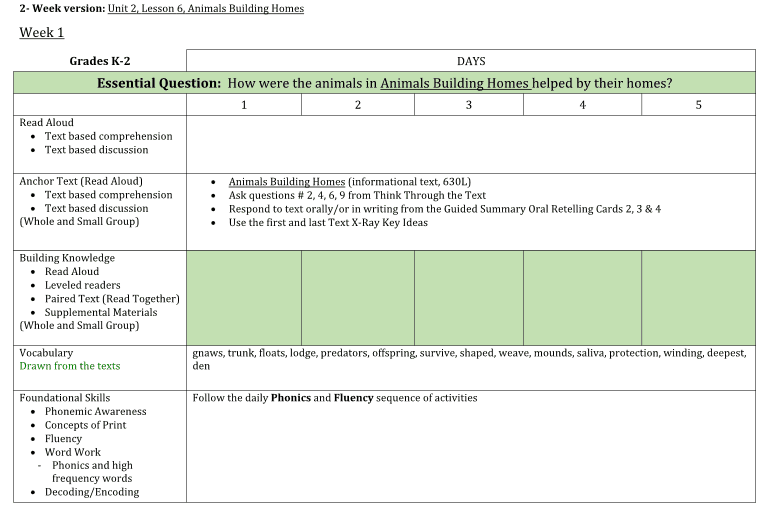Editor’s Note: All of the adaptation materials mentioned in this article are available for free on Achieve the Core.
I teach 3rd grade students in Shelby County Schools in Memphis, Tennessee, one of the largest urban school districts in the country. Though I’ve taught for more than 13 years, teaching reading still intimidates me because I know just how important my work is. Some may not think it’s a big deal: “It’s just the third grade;” “There’s still plenty of time to catch students up.” But the reality is there isn’t time! In 2011, the American Educational Research Association stated that a student who can’t read on grade level by the 3rd grade is four times less likely to graduate from high school by age 19. During a child’s first four years of schooling (K–3), they are learning to read. After that, they are reading to learn, or at least that’s the expectation. Instructional materials that both support my instruction and align to the standards in my state are critical to my work.
Over the past several years, as states across the country adopted the Common Core State Standards (CCSS), districts were busy selecting new materials. Shelby County Schools was no different. In 2014, Shelby County Schools adopted Houghton Mifflin Harcourt (HMH) Journeys Common Core for reading instruction in K–5. However, there were concerns about whether the texts met the demands of the Common Core. To address those concerns, Shelby County Schools partnered with Student Achievement Partners on the Materials Adaptation Project (MAP).
My Journey as a Journeymaster
A couple of years, ago I worked on the math textbook adoption committee for the state of Tennessee. We received guidance from the experts at Student Achievement Partners and I was impressed with their deep content knowledge of the CCSS, and their understanding of how these standards could prepare our students for college and careers. When I was asked to join Student Achievement Partners’ Materials Adaptation Project as a Journeymaster, I jumped at the chance. A Journeymaster is an experienced Journeys user who was accepted through an application process to align Journeys with college- and career-ready standards. As Journeymasters we will also provide PD about the materials to other teachers in our district throughout the year.
As Journeymasters, we came together for the first time in April 2016 to begin learning and working on the Journeys Materials Adaptation Project. The MAP Guidance Documents provided an overview of the strengths in alignment and the changes needed in Journeys Common Core. As a result, we quickly learned that our students and teachers would benefit greatly with some lightweight adjustments to align the Journeys Common Core materials to college- and career-ready standards.
The adaptations focused on five to six lessons within each grade level that had the most worthy texts. (Lessons with lower caliber texts were eliminated to allow educators to focus more attention on the high-quality texts.) Our adaptations utilized the questions in those lessons that supported student comprehension and helped students practice finding textual evidence to support their answers. We also recommended additional materials to help students build their knowledge on a topic via a volume of texts on specific topics. When students’ knowledge of a topic increases, so does their vocabulary and their reading comprehension.
During our training, there were a lot of “aha moments” for me. For example, during my 13 years in education, I’ve taught both 1st and 4th grades and when I reviewed student performance data, the critical factor for success in both grades was vocabulary knowledge. Thus, when the presenters at our training stated that four times as much academic vocabulary is gained when students have access to multiple texts on a topic, I made an immediate connection to what I’d seen in the classroom with my students, and recognized how important it was for us to bolster vocabulary building in Journeys.
Our work as Journeymasters was to take existing Journeys lessons and expand them by building two-week units of instruction that provided a collection of texts on a topic to build student knowledge. These Two Week At a Glance units, or TWAGS, included guidance teachers would need to deepen and expand existing Journeys lessons, providing students with the structure and time they need to build content knowledge, vocabulary, and college- and career-ready literacy skills. Journeymasters worked with teachers across the district to ensure that the TWAG content and supplemental materials were aligned to a topic and used text-specific questions and writing tasks that would focus student effort on the topic.
 An example of a Two Week At a Glance (TWAG) guidance document
An example of a Two Week At a Glance (TWAG) guidance document
Using Guidance Documents to Improve Instruction
The Journeys Common Core Materials Adaptation Project includes a Project Guide that outlines:
- The strengths and weaknesses in alignment for Journeys Common Core 2014
- The modifications necessary to improve alignment
- A materials overview with a detailed explanation of a TWAG, including supplemental resources and Rules of Thumb for instructional use
The project also generated a Decision Matrix for Journeys 2014 that allows educators to easily see which lessons are worthy of study and which ones can be eliminated from instruction. This document takes the legwork out of looking for supplemental resources; a spreadsheet delineates a list of supplemental books included in the TWAG lessons.
Last, but certainly not least, are the five or six TWAG lesson documents for each grade (K–5), including the supplemental materials.
Next Steps
As Journeymasters, we have already been hard at work sharing this resource with teachers across our district over the summer. During our first week of in-service training, ELA teachers in grades K- 5 were required to attend MAP sessions to become familiar with this new resource. As Shelby County Schools teachers began the school year on August 8th, they could feel confident knowing they had access to high-quality lessons and materials aligned to the Standards. However, we still have work to do as we enter the implementation stage. As Journeymasters, we will solicit feedback from teachers about their experience implementing the TWAG lessons to improve the alignment of classroom practice and materials with college- and career-ready standards.
This year I’m teaching 3rd grade. Check back for my next post describing my experience implementing the Roberto Clemente TWAG lesson with my students.

















Will you be reviewing and making recommendation for the Journeys 2017 program?
Unfortunately we don’t currently have plans to share adaptation recommendations specifically for Journey’s 2017 at this time.